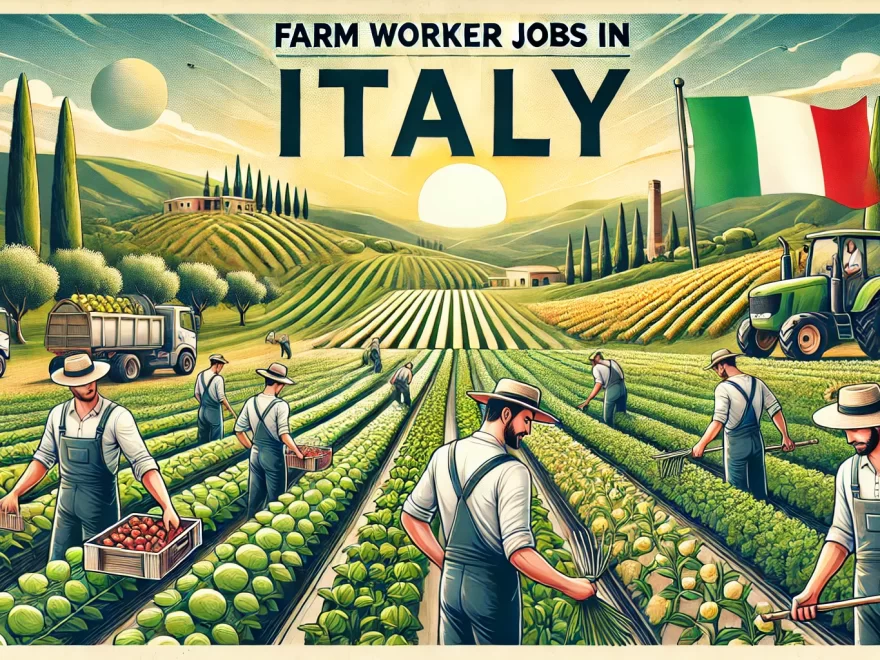Farm Worker Jobs in Italy: A Complete Guide to Opportunities and Growth
Italy, known for its rich agriculture, vineyards, and olive groves, offers thousands of farm worker jobs every year. The country depends heavily on agriculture, and with a shortage of local labor, foreign workers play a vital role in farming industries.
If you are interested in working as a farm worker in Italy, this guide provides insights into job roles, salaries, visa requirements, and how to apply.
Why Are Farm Worker Jobs in Demand in Italy?
Italy is one of Europe’s top agricultural producers, famous for its grapes, olives, wheat, citrus fruits, and dairy products. The demand for seasonal and full-time farm workers is increasing due to:
🍇 Vineyards & Wine Production – Italy is a global leader in winemaking.
🫒 Olive & Fruit Harvesting – High demand for workers in orchards.
🌾 Crop Cultivation – Wheat, rice, and corn farms need laborers.
🐄 Livestock & Dairy Farming – Italy produces world-class cheese and dairy.
🌿 Organic Farming – Demand for sustainable farming practices is growing.
Many farms hire workers from Africa, Asia, and Eastern Europe to fill labor shortages, especially for harvesting seasons.
Types of Farm Worker Jobs in Italy
Farm work in Italy is diverse, and workers can find employment in different agricultural sectors:
1. Fruit & Vegetable Pickers
- Harvesting grapes, apples, oranges, tomatoes, and olives.
- Sorting and packing produce for export.
- Working during peak harvest seasons (April–October).
2. Vineyard & Winery Workers
- Picking and processing grapes for wine production.
- Maintaining vineyard fields and irrigation systems.
- Assisting in bottling and packaging wine.
3. Livestock & Dairy Farm Workers
- Taking care of cows, goats, and sheep.
- Assisting in milking, feeding, and cleaning stalls.
- Helping with cheese production (Mozzarella, Parmesan).
4. Greenhouse & Organic Farming Workers
- Growing vegetables, flowers, and herbs.
- Managing irrigation and pest control.
- Working with sustainable farming methods.
5. Farm Equipment Operators
- Driving tractors, plows, and harvesting machines.
- Performing basic maintenance on farming equipment.
6. Seasonal Farm Workers
- Temporary farm workers hired for peak seasons.
- Working under Italy’s agricultural seasonal work visa.
Salary Expectations for Farm Workers in Italy
Salaries for farm workers in Italy vary based on experience, type of work, and employer. Below is an estimated salary range:
| Job Role | Monthly Salary (€) |
|---|---|
| Fruit & Vegetable Picker | 900 – 1,500 |
| Vineyard Worker | 1,000 – 1,600 |
| Livestock Farm Worker | 1,200 – 1,800 |
| Dairy Farm Worker | 1,300 – 2,000 |
| Greenhouse Worker | 1,000 – 1,700 |
| Farm Equipment Operator | 1,500 – 2,500 |
Additional Benefits:
✔ Free accommodation and meals (for seasonal workers)
✔ Overtime pay
✔ Health insurance
✔ Paid vacation days
How to Apply for Farm Worker Jobs in Italy?
1. Online Job Portals
Many Italian farms and recruitment agencies post job vacancies on agricultural job websites. Some of the best platforms include:
- Indeed Italy (www.indeed.it)
- EURES Italy (www.eures.europa.eu)
- Agrijob Italy (www.agrijob.it)
- Coldiretti Jobs (www.coldiretti.it)
2. Farm Companies & Agricultural Cooperatives
Many farms hire workers directly. Some top agricultural regions in Italy include:
- Tuscany & Piedmont – Vineyards & wineries 🍷
- Sicily & Calabria – Citrus fruit & olive farms 🫒
- Lombardy & Emilia-Romagna – Dairy & livestock farming 🐄
- Veneto & Puglia – Organic vegetable farming 🥦
3. Recruitment Agencies
Several agencies specialize in hiring farm workers for seasonal or permanent contracts:
- Confagricoltura Employment Services
- Alma Laboris Farm Recruitment
- Manpower Italy – Agriculture Division
4. Walk-in Interviews
Some farms directly recruit workers, especially before harvest season. If you’re in Italy, visiting farms in rural areas and asking for work can sometimes lead to a job offer.
Visa and Work Permit for Farm Workers in Italy
To work legally in Italy, foreign workers need a visa and work permit. The Italian government issues two main types of visas for farm workers:
1. Seasonal Work Visa (Decreto Flussi Program)
- Issued under Italy’s Seasonal Work Permit Program.
- Valid for 3 to 9 months for fruit picking, vineyard work, and harvest jobs.
- Employers sponsor the visa for foreign workers.
2. Long-Term Work Visa
- For permanent farm jobs (livestock farming, dairy, equipment operators).
- Requires a valid job contract from an Italian employer.
- Leads to a temporary residence permit in Italy.
Visa Application Process
✅ Step 1: Find a job and get an offer letter.
✅ Step 2: Employer applies for your work permit (Nulla Osta).
✅ Step 3: Apply for a work visa at the Italian embassy in your home country.
✅ Step 4: Travel to Italy and start working!
Career Growth in Italy’s Farming Industry
Farm work in Italy offers opportunities for career advancement:
🔹 From Fruit Picker to Farm Supervisor
🔹 From Dairy Worker to Cheese Production Specialist
🔹 From Tractor Operator to Agricultural Technician
🔹 From Seasonal Worker to Permanent Farm Employee
Some farms offer training programs in organic farming, viticulture, and agribusiness, which can help workers move into higher-paying agricultural roles.
Challenges of Farm Work in Italy
While farm jobs in Italy provide stable employment, they come with some challenges:
❌ Seasonal Nature – Many jobs last only for harvest months.
❌ Hard Physical Labor – Requires long hours of manual work.
❌ Language Barrier – Basic Italian language skills help in communication.
Final Thoughts
Farm worker jobs in Italy provide great employment opportunities, especially for foreign workers looking for seasonal or long-term jobs. With good salaries, free accommodation, and job stability, Italy remains a top destination for farm laborers.
If you have experience in agriculture and are looking for a stable farm job with visa sponsorship, consider applying through online job portals, recruitment agencies, or farm cooperatives.
